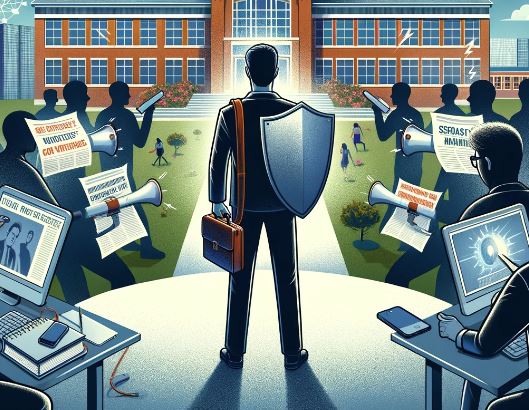


Today’s Lesson for Schools: Crisis Communications as a Solution
By Thom Fladung, Hennes Communications
Today’s assignment: Search “crises and schools” in a Google news search. You’ll find 382,000 results. Here’s a quick headline sample:
- A Crisis of School Absences
- Mental health crisis in schools: 4 ways educators can take action
- Report: Schools Won’t Recover from COVID Absenteeism Crisis Until at Least 2030
- Crisis In The Classroom: Confronting the image problem public schools face
The variety of reputation-threatening crises that a school may face is reflected in the work we’ve done at Hennes Communications with schools and school districts over just the past 12 months include:
- Sexual misconduct allegations involving teachers
- Sexual misconduct allegations involving students
- Tense labor negotiations
- Superintendents facing no confidence votes from teachers
- Superintendents and school boards attacked on social media by parents
- Property tax disputes
- Transportation issues
- Challenges from charter school incursions
- Workplace discrimination allegations
- Controversial books in school libraries
- Controversial speakers invited to appear at school events
- Diversity, equity and inclusion issues
Schools are complex operations that extend beyond education to include childcare, security, transportation, food services and more, making them particularly vulnerable to a crisis played out in public.
Today’s educational leaders face unprecedented challenges, including managing the implications of widespread smartphone use among students, navigating political agendas, dealing with often misinformed or angry public sentiment and adapting to the rapid societal changes brought about by the COVID-19 pandemic.
School leadership teams must address these issues when they arise because teachers, staff, parents and students are all awaiting a response.
While specific situations require customized communication strategies, some fundamental principles and best practices remain consistently important.
Effective Crisis Communications
First, understand that you can’t communicate your way out of a challenge. Actions must accompany words – and you must communicate those actions in clear, concise language.
Second, at Hennes Communications we rely on our Damage Control Playbook and its five simple concepts:
- Tell the truth, because the truth will come out. Try to cover it up or, worse, lie about it and you’ll find yourself with a new and likely more serious crisis.
- Tell it first, to avoid letting others control the narrative.
- Tell it all by sharing as much information as legally and practically possible, to prevent speculation and misinformation.
- Tell it fast by communicating swiftly, as delays will likely lead to others framing the story.
- Tell it to the people whose opinions you care about the most by prioritizing communications to the people most affected by or concerned about the crisis.
Apply these approaches and you’ll also avoid the trap of “no comment” which almost always equates to a guilty plea in the Court of Public Opinion.
Building a Crisis Communications Plan
A crisis communications plan is an insurance policy for your reputation. The plan outlines who speaks on behalf of your school or district, what they say, to whom they say it, and how and when the message is delivered.
Developing this plan begins with conducting a “vulnerability audit” to identify potential crises and create messages for key audiences. Such a plan, created with input from all relevant parties including legal counsel, enables a fast response to the crisis, ensuring that your community hears from you first. Once the crisis scenarios are determined, each scenario is matched with messages specific for each stakeholder group along with step-by-step instructions and checklists, providing a pre-approved blueprint for the crisis response team to quickly follow – even if the superintendent or board chair isn’t available.
Conclusion
Preparing for crises with a comprehensive communications strategy is essential for navigating the complexities facing today’s educational institutions. “We’ll wing it” isn’t a plan or a viable strategy. Act decisively, communicate effectively and your school – or any organization for that matter – can manage the crisis and maintain your reputation.
————————————————–
Since being founded in 1989, Hennes Communications has worked with scores of schools, school districts and other education organizations, as well as with companies, organizations and government entities across market sectors.
For information about how your school district or organization of any type can have a crisis communications plan tailored to your exact situation and specifications, please contact Hennes Communications at info@crisiscommunications.com or 216-321-7774.